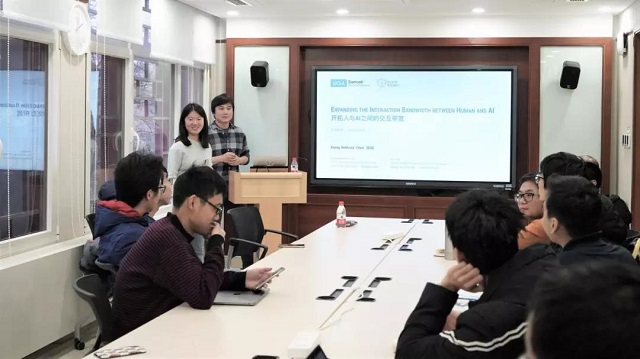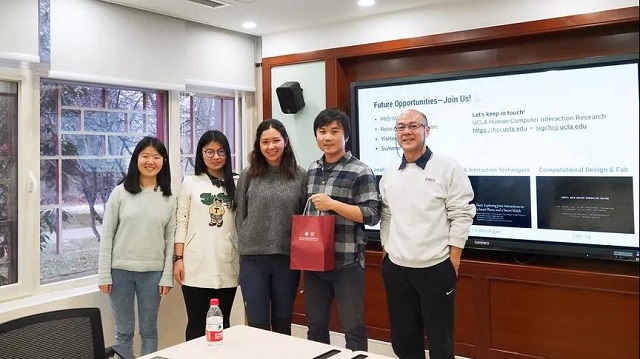Dr. Xiang Chen from University of California, Los Angeles Visits CFCS
On December 24th, 2019, Dr. Xiang Chen, assistant professor from University of California, Los Angeles visited Center on Frontiers of Computing Studies (CFCS) and gave a lecture titled "Expanding the Interaction Bandwidth between Human and AI". Dr. Yuqing Kong from CFCS hosted the lecture.


Abstract:
The recent development of artificial intelligence (AI) promises a future of data-driven automation that can replace most of today/s human efforts. However, currently most AI-enabled systems—often functioning as 'black boxes'—struggle to accommodate, learn from or communicate with humans. One fundamental problem is a limited interaction bandwidth between human and AI: currently, AI's development is bestowed upon the few experts; for users in non-computing domains, there is limited support for them to comprehend, customize or collaborate with AI. As we are on the cusp of defining the future of human-AI relationship, it is important to create new interaction channels to bridge AI and non-computing users. In this talk, I will discuss three research thrusts for expanding the interaction bandwidth between human and AI:
Human ← AI: making AI comprehensible to non-computing domain users. Going beyond system-centered prior work that focused on generic explainable representations of AI (XAI), my research takes a user-centered approach: for example, CheXplain is a system co-designed via iterative studies with medical professionals, which enables referring physicians to explore and understand AI's diagnosis on chest X-ray images.
Human → AI: enabling non-computing domain users to customize AI. Contrary to providing a single label and relying on AI to reverse-engineer the reasoning process, my research investigates techniques for users to express their domain knowledge in ways that are understandable and learnable to an AI: for example, Robiot employs computer vision to interpret a user's demonstration of a physical task, which is translated in a vocabulary that informs an AI to generate robotic mechanisms to automate such tasks.
Human ↔ AI: supporting collaboration between non-computing domain users and AI. Building upon comprehensible and customizable AI, my research takes an integrated approach that creates an environment to support human-AI collaboration: for example, Forte allows a mechanical engineer to sketch a high-level functional and aesthetic design while an AI handles the low-level generation of structures that realizes such design.
Biography:
Xiang 'Anthony' Chen is an Assistant Professor in UCLA's Department of Electrical & Computer Engineering. Anthony's area of expertise is Human-Computer Interaction (HCI). He received his Ph.D. in the School of Computer Science at Carnegie Mellon University in 2017 and was a recipient of the NSF CISE CRII Award and the Adobe Ph.D. Fellowship. His research is at the intersection of sensing & interaction techniques, intelligent user interfaces, and computational design & fabrication. Anthony's work has won two best paper awards and one honorable mentioned in top-tier HCI conferences.






